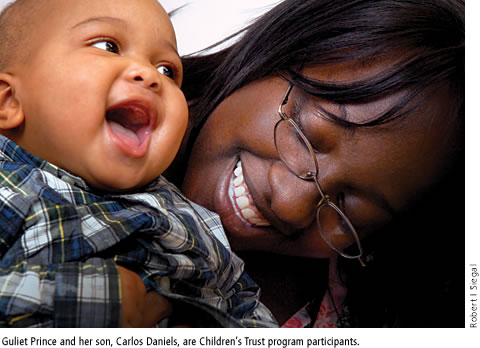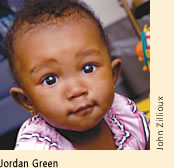 |
 |

“You are doing a good job writing letters on your paper,” Elana Mansoor, Psy.D., tells 4-year-old Nicolas, placing a sticker on the back of his hand as he waits for his parents to finish the last few minutes of a Families First session. His face lights up and he returns to his work. “Did you see that?” Mansoor asks the parents at the table, a diverse group that includes a range of ages, ethnicities, incomes, and family situations. “How do you think using praise will affect his behavior in the future?”
Giving praise—using eye contact and being specific directly following a positive behavior—helps reinforce behaviors parents want to increase in their children. It is one of the tools taught as part of Strengthening Multi-Ethnic Families and Communities, a 12-week parenting program offered by the Families First Network, a University of Miami Miller School of Medicine program funded by The Children’s Trust and directed and coordinated by Mansoor and fellow psychologist Connie Morrow, Ph.D.
“Families need help,” says Nicolas’s father Pablo, who alternates visits to the sessions with his wife, Nicolas’s mother Lorrie. On a rare occasion, the working parents attend the session together and bring Nicolas with them. “Parents don’t have a lot of time to spend with their children, and when they do, they are stressed. We need to learn to be parents and use the time we have with our children in a positive way. This class has changed my time with Nicolas.”
Families First is the longest running of the many initiatives at the Miller School funded by The Children’s Trust, which address injury prevention, dental health, obesity prevention, and children with developmental disabilities.
Regardless of whether the program is based at the University, Miller School faculty have been deeply involved with the development and leadership of almost all health-related programs funded by The Children’s Trust since its inception.
“Everything we do in the area of health is evidence-based and has outcome measures,” says Andrew Brickman, Ph.D., executive director of health programs for The Children’s Trust. “Our relationship with the University of Miami ensures we have access to experts in all areas of health in which we’re engaged. We consult with UM faculty to obtain expert guidance.”
Despite its significant positive impact on the health, safety, and well-being of Miami-Dade County children, voters must still decide on August 26 if tax dollars will continue funding the Trust’s $100 million annual budget. Board members and supporters have been preparing for the vote, which was required in guidelines when the Trust was approved in 2002.
If approved by voters, The Children’s Trust will serve the children and families of Miami-Dade County in perpetuity. If it is not approved, the 400 programs it supports will be at risk of collapse.
 “Before Families First, there was a huge gap in the community—there was no place to send parents who needed basic education and support, and we didn’t have the funding to address that need,” says Morrow, research associate professor of pediatrics, who oversees Families First. “The Children’s Trust has opened up the door for a whole range of prevention-oriented services for young children and families that didn’t exist before.” And without the astronomical price tag that often accompanies such services. “Before Families First, there was a huge gap in the community—there was no place to send parents who needed basic education and support, and we didn’t have the funding to address that need,” says Morrow, research associate professor of pediatrics, who oversees Families First. “The Children’s Trust has opened up the door for a whole range of prevention-oriented services for young children and families that didn’t exist before.” And without the astronomical price tag that often accompanies such services.
Housed within the Perinatal CARE (Chemical Addiction Research and Education) Program in the Department of Pediatrics, the Families First Network offers group services, including a nine-week Baby & Me course for parents with children up to age 1; Strengthening, a course for parents with children ages 5 and younger; and monthly parenting seminars offered regularly at community centers, schools, churches, and clinics. Families First also provides developmental consultation to families at several local pediatric health care sites.
“This is a chance for me to talk to other parents about what their babies are doing and what I should expect,” says 21-year-old Brittney Ward, holding her 4-month-old daughter, Nylah, at a graduation for the Baby & Me course held at Jackson North.
Parents who participate in Families First sessions gain confidence and show increased knowledge about effective parenting practices. “It’s prevention focused,” says Morrow, who developed the Baby & Me curriculum. “The overall goal is to enhance the attachment relationship, and by doing that you’re going to have a trickledown effect to other long-term goals.”
HealthConnect Transforms Health Outcomes for Students
While programs like Families First address a child’s health and well-being though the parent-child relationship, other Children’s Trust programs like HealthConnect aim to increase access to care. HealthConnect, a newer, wide-scale Children’s Trust initiative, has drawn support from a long list of agencies such as the Miami-Dade County Health Department, Miami-Dade County Public Schools, and the Human Services Coalition.
HealthConnect works to transform health outcomes for Miami-Dade children through three primary programs: HealthConnect in the Community, which helps families navigate the health care system; HealthConnect in the Early Years, which teaches basic skills to all first-time and teen parents during home visits; and HealthConnect in Our Schools, an initiative that brings together public schools and community agencies to provide health care and mental health services to students through an on-site health suite.
Teams comprised of a nurse or nurse practitioner, social worker, and two health aides are stationed in pairs of schools and furnished space where they can administer vaccines and provide basic services. “Our goal is to place a nurse, a social worker, and a health aide in every school in the county by 2011,” says Brickman, whose role as executive director of health programs includes overseeing HealthConnect.
Baseline research conducted by The Children’s Trust revealed that of 350 public schools in Miami-Dade County, only 20 had health clinics. The ratio of students to public health nurses was about 31,000 to 1, says Judy Schaechter, M.D., associate professor of pediatrics at the Miller School and chair of The Children’s Trust health committee.
Booker T. Washington High School, one of six schools affiliated with the Miller School in the HealthConnect network, is located in Overtown, a Miami neighborhood with a median household income of $14,405. Before the launch of HealthConnect, the high school lacked a system for addressing students’ health needs; many are uninsured and some homeless.
“Many of the kids within this feeder pattern do not have any type of medical insurance,” says Joycelyn Lawrence, M.D., medical director of the Dr. John T. Macdonald Foundation School Health Initiative and clinical assistant professor in the Miller School’s Department of Family Medicine and Community Health. “For those kids, we are their medical home.”
Today, the HealthConnect team at Booker T. Washington includes social worker Kimberlee Giddens, patient care associate Gladys Jarquin, and nurse Marjorie Raymore, R.N. Third-year Miller School students support the staff when they rotate through the school-based clinics.
A modest clinic with an exam room and two beds allows the medical team at Booker T. Washington—joined regularly by Lawrence—to provide services that include vision exams, obesity prevention, physical examinations, and the maintenance of programs for chronic diseases like asthma and diabetes. When the school-based team identifies health issues beyond their scope of care, they can refer students and parents to health navigators at The Children’s Trust.
“When you need somebody, you know they’ll be there,” says Jessica Alvarado, a junior at Booker T. Washington, who received an eye exam at the clinic and was referred to an ophthalmologist. “It was free, which was a big help for my mom.”
The upcoming vote provides Miami-Dade residents with the opportunity to restate their commitment to The Children’s Trust mission: to “improve the lives of all children and families in Miami-Dade County by making strategic investments in their futures.” As the election nears, physicians in the Miller School’s Mailman Center for Child Development will continue to advocate for children.
“If ever there was an example of an ounce of prevention being worth a pound of cure, this is it,” says Schaechter. “When people say that children are our future, this is what they’re asking for. This is our chance to be the decision-makers at a small cost on the personal level. It’s a community partnership.”
 Serving Our Children Serving Our Children
More than 400 programs serving Miami-Dade children of all ages are supported by The Children’s Trust, which Daniel Armstrong, Ph.D., director of UM’s Mailman Center for Child Development, calls the “greatest gift the county has ever given itself.”
Approved by voters in 2002, The Children’s Trust is an independent special taxing district funded through a tax levy based on a percentage of each taxpayer’s property value. For a person owning a home assessed at the median taxable value (without homestead exemption), this translates to costs of approximately $61 annually.
A “sunset provision” requires that The Children’s Trust initiative be returned for voter approval. The vote is set for August 26. If it is approved, The Children’s Trust will join children’s service councils in seven other Florida counties as a permanent source of funding. Following is a brief description of other Children’s Trust programs affiliated with the University of Miami Miller School of Medicine:
Early Service Delivery Partnership
A collaboration of 11 service providers and four referral sources led by Susan Gold, Ed.D., associate professor of pediatrics and education at the Miller School, the Early Service Delivery Partnership provides services to children from birth to age 5 who ordinarily would not be eligible for these services because their symptoms are considered too mild to meet the current requirements of the Individuals with Disabilities Education Act.
DEB-Tech
Kathleen Vergara, associate director of The Debbie Institute, a division of the Mailman Center for Child Development at the Miller School, oversees DEB-Tech, a program that makes assistive technologies and summer programs available to children with developmental disabilities.
Healthy Steps
Eugene Hershorin, M.D., associate professor of clinical pediatrics, leads this effort, which places a developmental specialist in pediatric practices to provide guidance and consultation to parents.
Jump Start
Developed and led by Lee Sanders, M.D., M.P.H., associate professor of clinical pediatrics, this program works with child care centers on early intervention for childhood obesity.
Reach Out and Read
Led at the Miller School by Lee Sanders, M.D., M.P.H., associate professor of clinical pediatrics, this program encourages early literacy by providing books to parents and children during visits to the pediatrician.
PATCH Pediatric Oral Health
Louisa Utset-Ward, D.D.S, voluntary faculty member at the Mailman Center, provides basic oral health services to children in the Head Start program.
WalkSafe
Implemented in conjunction with the Miller School’s Department of Surgery, WalkSafe is an elementary school-based program led by research associate professor Gillian Hotz, Ph.D., that aims to reduce injuries from pedestrian accidents by providing safety education in classrooms. |
|
 |
 |


